
When Mother Theresa said, “We need to find God, and he cannot be found in noise and restlessness. God is the friend of silence…We need silence to be able to touch souls,” perhaps she’d not considered the ability of music, made while commingling the worlds of flesh and spirit, can illuminate God, religious images and traditions in respectful, playful and contemplative and sometimes negating ways. In other words, using music to touch and nurture souls.
For over two decades, West Virginia songwriter Michael John Iafrate has done just that while honing his craft as a songwriter and performer alongside his work as a member of some of West Virginia’s most creative independent music acts such as The Minus Tide, COBRA, and Killed At Camp. More recently, Iafrate has carefully developed his unique voice among regional songwriters, both solo and with a full band as M Iafrate & The Priesthood.
Iafrate’s soft-spoken, contemplative song-explorations are enriched by his training as a theologian—asking more questions than providing answers. Whether performed solo or fleshed out by kindred musician-spirits, Iafrate’s songs reveal shifting shades of meaning and flexibility and offer the incense of devotion to such influences as Jason Molina, Will Oldham, Neil Young, and classic R.E.M.
Following M Iafrate & The Priesthood’s acclaimed 2005 full-length O Happy Marriage, Iafrate released the 2011 solo EP No Matter How Deep the Darkness, He Descends Deeper Still and a number of singles and other tracks as he prepared two new albums. M Iafrate & The Priesthood released Christian Burial on May 26, 2017, which willfollowed soon after by the full-length Nonsubstantiation under Iafrate’s own name.
Each record presents Iafrate’s introspective “theo-folk” through thoughtful and dignified arrangements and will solidify Iafrate’s place, in the words of one of the state’s most seasoned music veterans, as “West Virginia’s most esteemed hyper theologian.”
Ghettoblaster recently caught up with Iafrate to discuss his faith, his music, his family and his mission. This is what he told us.
Photos by Erin Yaeger
Once upon a time there was a stigma attached to being a Christian musician who talked about Christianity within the context of their music. Knowing you and your approach to both your faith and music it isn’t terribly surprising to me that these things are intertwined and that those worlds are lined up to some degree. But I imagine it is a hard sell for those that aren’t Christian. Do you have challenges when explaining how your faith and music intersect?
That comes up sometimes. It will probably come up in more unexpected ways now that the record is out. For example, my bios often talk about my studies in theology. I have a video coming out where I’m wearing a priest’s collar. I’ve had people ask whether I’m ordained. I’m not. I’ve had people ask if what I’m doing is Christian rock. It’s not.
I played a show at a coffeehouse over a decade ago and I played an old Christian hymn as part of my set, which isn’t something I do very much, but I did this time. I did it in the same mindset that someone like Will Oldham might do this kind of thing. And I tweaked some words in it that made it even a little blasphemous in a way. After I played it, the guy who owned the place asked me not to play anymore “Jesus songs.” So sometimes it doesn’t come across the way I want it to and maybe it puzzles people.
I say what I’m doing isn’t Christian rock, but I’m a practicing Catholic to a large degree; that’s a faith tradition that I care a lot about. I’m also a seriously critical Catholic. A lot of people in bands sing about faith and theological themes, but they don’t necessarily share why they’re doing it. It just happens to maybe run through the songs a bit. I’m a little different in that regard; I’m pretty forthcoming about why that is in my music. It has to do with my life as someone who has spent a lot of time studying theology. It is what I think about, so it comes out in the songs. Usually it comes out in ways that are not quite direct, or not pushing a particular message per se, and certainly not one of proselytizing or asking people to convert or something. I’m often being playful about religious ideas or pointing to certain images, traditions, or beliefs in order to affirm, or question or negate them. It does any number of things, depending on the song.
More and more of my songs do have a spiritual or religious element to them, whether it is the explicit “meaning” of the song, or just a passing reference. When I’m writing that stuff just comes out.
It doesn’t seem like people get too much criticism for literary illusions, but there is something about Christianity that tends to get people catalyzed.
Yeah, I think whether you use religious language or not or what your spiritual inclinations are, music often deals with meaning in life – life and death, relationships, sex, God and the devil. Particularly in the stuff I like. Country music talks a lot about the devil. It is all around us in music. Not to get too academic, but it raises the question of what is religion anyway? It is the way we talk about what is most important and the way we make sense of our lives. Maybe you are using a more well known tradition to establish your religiosity, or maybe you are using the language of relationships to express it. It doesn’t matter. I tend to see a kind of religious language or a spiritual orientation in artists even when they’re not speaking in explicit religious terms, if that makes sense.
The current political climate is a challenging one to be in and I think people are internalizing that by asking what it all means or questioning their morals in terms of what is right and what wrong. It is especially timely now to be asking those questions given what is going on…
I totally agree. Another interesting thing about this batch of songs is that a good number of them were written when George W. Bush was president. A lot of the same questions that were consuming me – whether in my academic writing, my personal spirituality, or in my music – had to do with religious traditions and our everyday lives, politically or otherwise, and how Christianity is used for death-dealing actions in the world. That is a big theme in my songs. There are a couple songs on this record, and a few on my next record, that deal with that sense of hypocrisy in religion.
One song was written during the last presidential campaign while listening to people like Rick Santorum claim to be the high-profile representatives of what it means to be a Christian politician. That song seems even more deeply relevant now, and it will probably never not be relevant because that’s just a perennial temptation, I think, of religious traditions when they get linked to power.
This political climate has been polarizing people to push themselves even further to one side or the other and I think we’ll see even more extremism on both ends of the spectrum as result of “the new normal.”
For sure. One thing that I hope can come about as a result of this is more direct political engagement by musicians and other artists. I think we’re already seeing that. Anytime you have a politician like a Trump rise up there is more intense artistic critique. That should really be going on no matter who is in the big seat. But yeah, whether it is the content of the songs that people produce or more direct political engagement from people in music scenes on the ground with the benefits they put on or protests, that stuff is all vitally important and continues to be increasingly so. We need to be making contributions in order to become healthy and welcoming communities. Music can play a big role in that.
Do you think it will only become harder and harder for disadvantaged communities to participate in art because of defunding of programs that support the arts?
Possibly in some ways. But I grew up listening to and participating in punk rock communities so I see the value and necessity of people making and sharing music in ways that are outside of those types of things. I think any politically relevant music of a more radical sort is going to sidestep most of that stuff anyway.
That’s what we are trying to do in Wheeling through a music collective that Joshua Lee, Sean Decker, Matt Klempa, myself and others put together, called the Bridge + Tunnel Collective. It is kind of a way for us to organize independent musicians in the Wheeling area, which is similar to what you described: a kind of vacuum in terms of not having venues or a support system for people making original music, especially of a weirder variety. We are hoping to do some good things through that community that we’ve started.
You have an album premiere scheduled [Editorial Note: This took place on June 10] for Christian Burial. How did you get teamed up with Joshua Lee for the album premieres?
Josh has been playing lead guitar and other things with me for over a year now. I met Josh when he moved to Wheeling with his wife and kids. His wife is from the area and he’s originally from Indiana. We were both born in the same place and our parents are from roughly the same places too. His family decided to relocate and I’d been hearing about him for a year or so, “There’s this guy in town and you guys have a lot in common musically.” He came to one of my shows and introduced himself and we hit it off. So we started hanging out and playing music together. He ended up supporting me at a lot of shows over the last year in a lot of different configurations.
Then when I was finishing up this record I asked him if he’d play keyboard on it because that is one of his primary instruments. The more we got to talking, as I was moving toward finishing this album, he was wanting to record his debut as a solo artist, and we came up with the idea to set a future date for a release and hold each other accountable to finishing our respective records. Things like this can drag on and on. This record took me six years to finish for various reasons, but I think having a date set and checking in with each other and then having them finished alongside each other and then celebrate by having a double release was a unique thing.
Will you be playing with a full band at the show and will it be the same configuration of players as they appear on the record?
Interestingly it will be most of the same musicians who play on the record, but they will be playing mostly different instruments. It is strange how that turned out. A lot of the musicians in the original lineup of the Priesthood were playing instruments that they don’t typically play. For instance, Clint Sutton contributed so much as the lead guitarist for most of the record, but he is a drummer first and foremost. So as the years went on, he got less and less comfortable, even in the time since he recorded his parts, playing guitar. So we are switching things around. Josh played organ on the record and he’ll be playing the lead guitar now. Dallas Campbell won’t be performing, but he’s on the record. Sean Decker will be switching to bass. Dave Klug will be at the show playing percussion. It has to do with where people are right now and what is going on in their lives, but it also has to do with the lineup that I have on the second record I’m working on, which is almost finished tracking. It will be out early next year. The lineup for that record is pretty much what I’m doing live with Clint on drums and Josh on guitar and things like that. So that’s where we are as a lineup live into the foreseeable future. So it isn’t really new people, just people switching what they are doing.
You recorded these records with Dave Klug?
I did, yeah.
Is being in a studio with Dave different than being in a more democratic band type atmosphere with Dave, as you were when you played together in The Minus Tide?
That’s a good question. We’ve been friends for about 20 years, but it just seems like the same old Dave and the same old me, I guess. We are sitting in different spots and doing different things in a technical way, but it has always been a good experience making music with Dave. He’s really good at what he does and he has so many talents. It was a really good experience.
What are your favorite moments on Christian Burial and why are they your favorite moments on the record?
Well, one of them would be the lead single “Get Behind Me.” That one turned out really well. It is probably a good example of what we were talking about earlier with themes of hypocrisy in religion, in particular Christianity. The video that we just shot gets at this too, although it’s not quite done. I love the pedal steel guitar that William Matheny contributed to that song and a couple of other ones.
I like the way “My Body Will Speak To You” stands out as the most country song. I love Haley Slagle’s backing vocal on it. The bridge to “No Home” really gets me. It has a really gangly REM sound with the 12-string guitar. Some of the little production details make it sound pretty interesting throughout and I’m pretty proud of those. The very last song, “A Fall Headlong,” has my daughter singing and doing some spoken word. That wasn’t quite a last minute decision, but a late in the game choice to have her on the record. That is something I wouldn’t have conceived at all when I started the record because she was two-years-old. Now she’s eight, and she is playing music with her friends in Morgantown through a program there. So to have her be able to contribute that way to the last few minutes of the record felt really good.
I’ve talked with some other musicians about parenting and whether you encourage children to pursue the things that you are really interested in. With my son I wonder if the things that I love won’t be the same things that he has a strong passion for. Did your daughter come to you with an interest in music on her own? Was it repeated exposure? Or is she just naturally gifted in that way and in her desire to follow that?
It has felt really natural from where I stand. She’s surrounded by music at my house and at her mother’s house. She and I play music a lot and she’s been to my shows ever since she was little. There have been instruments around. Her mother’s husband works for a group in Morgantown called Pop Shop that starts with kids who are really young. She was actually the youngest last year at seven-years-old to start the program. They put kids into groups and teach them the instruments and how to play together as a band. A few times a year they’ll perform at the club in Morgantown, 123 Pleasant Street, on stage. The classrooms at the facility are set up with a stage, a PA, drums, and other instruments.
So, when she turned seven, it became, “Hey, would you want to try this out?” because she was showing a real interest in music. She’s played every session since, and she’s played five or six shows with her band at 123 or other places like that. We ask her every time this thing comes around if she wants to do another one and she always says, “Yeah, I want to try this instrument now.” Her pitch is great and she’s naturally comfortable performing for people. She’s starting to write songs.
So, I think it has to be natural. Often the environment, maybe mixed with genetics a little bit, can lead them a certain way. I grew up listening to music. My dad was a musician, there were always instruments around, and he has great taste in music. But, I didn’t really get interested in playing it until I was 14 or 15. So it took a little while for me. If it is going to happen it will happen, I guess. And it is happening for her and it is beautiful to watch that be part of her development as a person.
Will you be touring at all in support of the record?
We are still solidifying what the lineup will be beyond the release show. I’m at a place in life where I am a little more free to do some touring. Probably not long term touring or long trips. Everyone that I’m working with, including myself, has kids, so that is a factor. I would like to do at least a fair number of weekend outings, either with members of the band or solo. I think what I’m doing has a flexibility to it and I think we can do it in a number of different ways. But I’d like to do more touring with the band lineup.

You weren’t always making this country-tinged Americana sound. You have had an evolution as an artist and I think you are at a natural sweet spot as a musician now. What is it about this genre that is the best home for the things you are trying to communicate now?
I’ve been in a lot of bands over the years in the punk, emo, and heavy metal genres. I’ve also been doing this folky, acoustic type music since I was a teenager; solo, singer-songwriter stuff inspired by people like Billy Bragg, REM, Bob Dylan, Simon and Garfunkel, and others. It’s gotten a little more countrified over time and there are more Americana influences in there. But I’ve always had a desire to write songs that were my own, where I was saying something from my own viewpoint, rather than always being in a band situation where everyone is contributing to something that doesn’t belong to any single one of us.
When I was playing with The Minus Tide, I’d do acoustic shows and play my softer, more contemplative stuff, sometimes in the same show. It’s always been important to me. 15 years ago I guess I started getting in to more traditional forms of music through the back door of artists like Bonnie “Prince” Billy, Jason Molina, and the like – artists who were inspired by older forms of music like folk music or country music. The more you get into that stuff and try and figure out what the influences are, the more it leads you to things like a neo-traditionalist person like Gillian Welch, or even further to a place like Appalachian old time music. When I lived in Canada 10 years ago I really started to get into Appalachian old time music and started to learn clawhammer banjo. I think you can see more of that influence on my more current music. In fact, “Get Behind Me” comes across on the record as a twangy double guitar lead rock song, but it started with me playing some riffs on my banjo, which I later translated to guitar. That family of music is increasingly an influence on the music that I’m writing.
The more I’ve gotten in to other forms of music I’ve tried to be gentle in how I apply it to my music or how those sounds become present in the music. I mean, I don’t want to be in a bluegrass or country band. I want this to be my music, but with some of these sounds present in it. I’m not going to write songs about drinking whiskey – although I do like whiskey – but I don’t want to play the part of a country music singer. That said, I’ve played the part of being in a sci-fi metal band. But that’s not what this project is for. This is me being me and having whatever influences are there come out in the music in ways that feel genuine.
What are your loftiest goals for this undertaking?
I’m interested in leading what I might call a theological life and to have that life contain all these different elements to it, whether that is theological writing and teaching, whether it takes the form of music making and performing, whether it takes the form of activism. To me, these are all part of living a life that is creative and intentional and that is trying to contribute something positive to the world we live in. I would like my music making to be a significant part of that, and not necessarily having all these things be separate parts of the whole. I want them to intersect.
A lot of my academic writing has been on music and what it means to be a musician, but I talk about it in a theological way. I see all of these things as connected. Making music, writing, recording and performing music, can be part of a spiritual practice in one’s life, in expressing one’s self as a human being. Whether it’s on a smaller level and you hear something from me recorded on a four-track once every ten years, or whether it is something more intentional, like spending a significant amount of time putting out a record and talking to people about it and doing it in a semi-professional kind of way – no matter what, music is going to be a presence in my life. I can’t see my life without it at this point.
At the same time I’m not intending to be overly academic in this music. If I wanted to be really academic I’d probably be making math rock or something like that. And there was a time I may have wanted to do something like that, make something really weird with sounds no one had ever heard before. Now I want to do more traditional songwriting that has some shades of meaning or discussion that are not typically present in this genre or set of genres of music. Hopefully there is something for both the head and the heart in what I’m doing.
(Visit Michael Iafrate here:
https://www.facebook.com/pg/miafratepriesthood
https://www.songsofmichaeliafrate.com
https://www.facebook.com/modestysongs)


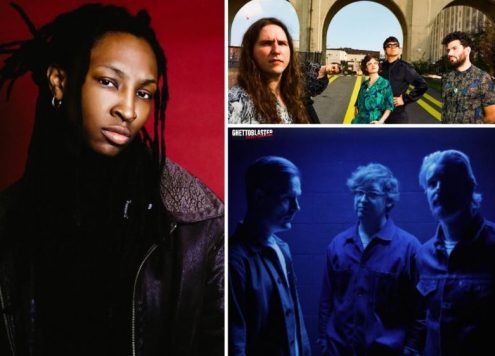
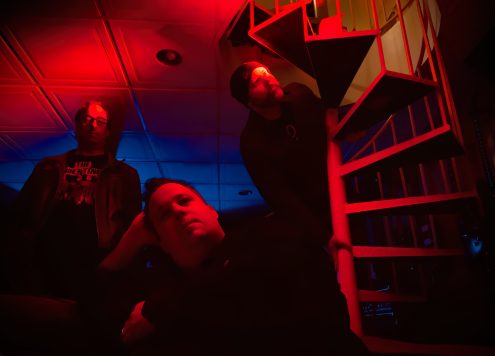
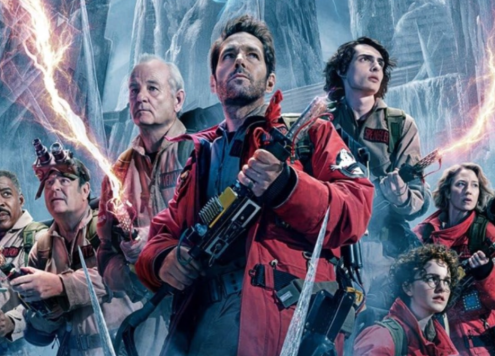

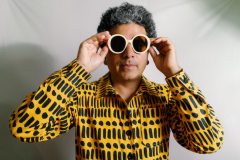
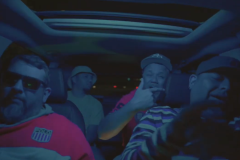
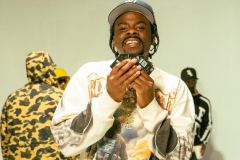
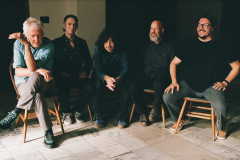

Social Media